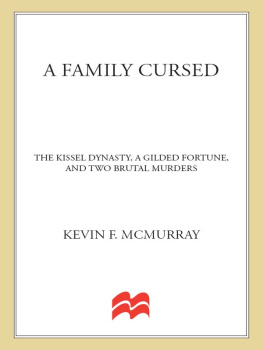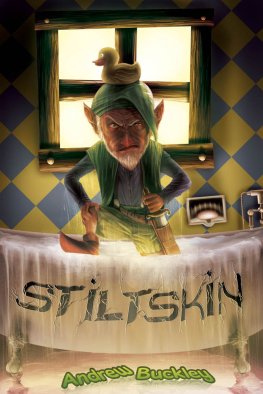Dear Reader:
The book you are about to read is the latest bestseller from the St. Martins True Crime Library, the imprint the New York Times calls the leader in true crime! Each month, we offer you a fascinating account of the latest, most sensational crime that has captured the national attention. St. Martins is the publisher of bestselling true crime author and crime journalist Kieran Crowley, who explores the dark, deadly links between a prominent Manhattan surgeon and the disappearance of his wife fifteen years earlier in THE SURGEON s WIFE . Suzy Spencers BREAKING POINT guides readers through the tortuous twists and turns in the case of Andrea Yates, the Houston mother who drowned her five young children in the familys bathtub. In Edgar Award-nominated DARK DREAMS , legendary FBI profiler Roy Hazelwood and bestselling crime author Stephen G. Michaud shine light on the inner workings of Americas most violent and depraved murderers. In the book you now hold, A FAMILY CURSED , acclaimed author Kevin F. McMurray follows the path of two brothers toward the same tragic end.
St. Martins True Crime Library gives you the stories behind the headlines. Our authors take you right to the scene of the crime and into the minds of the most notorious murderers to show you what really makes them tick. St. Martins True Crime Library paperbacks are better than the most terrifying thriller, because its all true! The next time you want a crackling good read, make sure its got the St. Martins True Crime Library logo on the spineyoull be up all night!

Charles E. Spicer, Jr.
Executive Editor, St. Martins True Crime Library
Chapter One
Some people just look right for their job. Frank Shea is one of them. If central casting asked for a streetwise New York City cop, a double for Frank Shea would answer the call. In his late fifties, with a wavy pompadour of reddish brown hair, the map of Ireland on his face, Shea was hardwired by genetics to be a cop. Socially, and perhaps even environmentally, he was destined to don New York City blue.
Hailing from the Rockaways in the borough of Queens, Shea had plenty of company from his home turf joining the force. For years this sandy peninsula that juts out into the Atlantic has provided many of the rank and file for the New York City Police Department (NYPD). No doubt, the disproportionate numbers of Irish-Americans who flocked to the Rockaways in the early 1900s had something to do with that. The century-old Irish lock on the NYPD and the fire department is easily proven simply by noting the preponderance of Irish surnames on the two departments rosters.
After high school, Shea joined the Marine Corps in 1965 and served his three-year stint with a thirteen-month tour of duty in Vietnam, coming home to New York in 1968. Discharged honorably in December of 69, Shea took the NYPD entrance exam on a whim, because a buddy was taking it. Shea scored high on the test, but because the city had a freeze on hiring, he took a job with Anheuser-Busch selling beer products. Three years later he received a call from the NYPD notifying him that they were hiring. At 22 years of age, Shea wasnt sure he wanted the job, thinking he might want to take advantage of the GI Bill and go to college, but with a wife expecting, he had to consider the job. He had an uncle, Bill Shea, who was a gung-ho detective with the department and he encouraged his nephew to give it a try, advising him that Frank was young and could always change his career if he didnt like it.
After the academy, Shea was assigned to the 26th Precinct in Manhattans Harlem section. After six months in uniform he was put into plain clothes in an anti-crime unit for three years. Following his detachment to anti-crime, he went undercover with the Street Crime Unit based on Randalls Island in the middle of New Yorks East River. The most elite squad in the department, limited to just 200 members, it was arguably the best crime-fighting force in the world. Its purpose was to stamp out violent street crime by spotting it before it happened, which meant most of its work was done at night in the most crime-ridden neighborhoods of the city. Frank Shea never went back to selling beer.
A new unit called the Career Criminal Unit was formed in 1978 and Shea was only one of five picked for this hazardous duty. The purpose of the unit was to tail hardened inmates recently released from prison who had a repeat history of violent crime.
Transferred to Brooklyns 75th Precinct as a whiteshield detective in 1980, Shea was assigned to homicide. In 1982 he was involved in a shooting where his partner was hit, and in the return fire, Frank shot the assailant. For his heroism, Mayor Edward Koch promoted Shea to gold-shield detective by proclamation. Brooklyns street gangs were not so generous. A contract on his life was issued, which prompted another transfer.
Sheas luck ran out in 1985 when he was involved in a car accident on his way to interview victims of a shooting at a Brooklyn hospital. Shea had to be cut out of the vehicle. After six months of rehabilitation the department doctors surveyed him out because he had suffered extensive nerve damage to his right arm and serious head injuries. Shea had given NYPD fourteen years of his life. He left with no regrets. Hed had a great career, made great friends and was content with the knowledge he had done his best.
After taking two years off for more rehabilitation, Shea became a salesman for a boat dealership in Farmingdale, Long Island, and did divorce and personal injury investigation work for some local attorneys on the side. With more work than he could handle, he formed Alpha Group Investigations in 1997. He now employs five full-time investigators and a handful of per diem operatives out of his Farmingdale office suite.
Alpha Group handles private cases, such as divorce, child custody and personal injury, as well as corporate work. The corporate investigation mostly involves due diligence, electronic counter measures (sweeping for bugs) and a lot of overseas travel. In his divorce work Shea found that most of his clients just wanted to know to dispel or confirm their suspicions about the infidelities of a spouse. Usually, Shea would relate, all they want is proof. Often child custody and a large amount of assets were at stake.
All of that came into play when Robert Kissel contacted the Alpha Group.
Chapter Two
Prime Focus Communication is an audio/video company specializing in whole house electronicssecurity, telephone, structured wire and computer systems, plus media rooms, home theaters and whole house audio-visual distribution networks. The product is decidedly upscale and most of the work done averages in the tens of thousands of dollars. Lance DelPriore started the business twenty years ago in the quaint, picturesque town of Brattleboro in the southeast corner of Vermont on the banks of the swift-running Connecticut River.
Twenty-seven years ago Lance and his four siblings migrated up from rural northeast Connecticut. They were escaping from an unhappy home life. The childrens father had deserted the family when Lance was just 4 years old. Lance remembers how his father had promised to return soon. His older brother Mike sat diligently every day in their homes living room, which afforded a view of the street, waiting for his dad to make good on his promise. One day two months later, young Mike, just 6, stormed out of the room and angrily announced that their wayward father was never coming back. He was right.
















